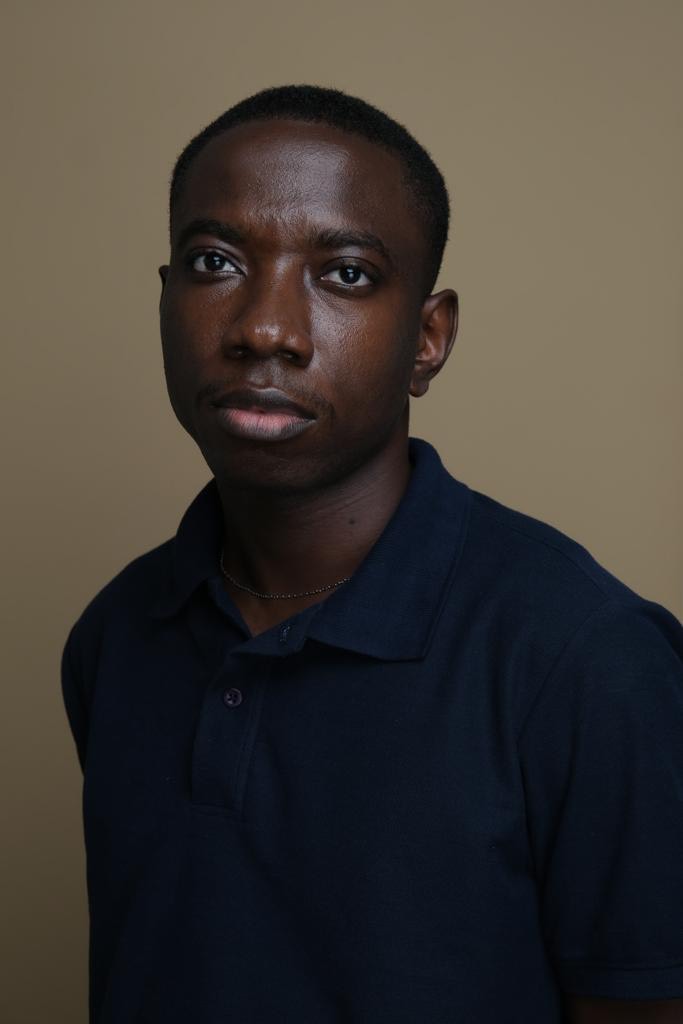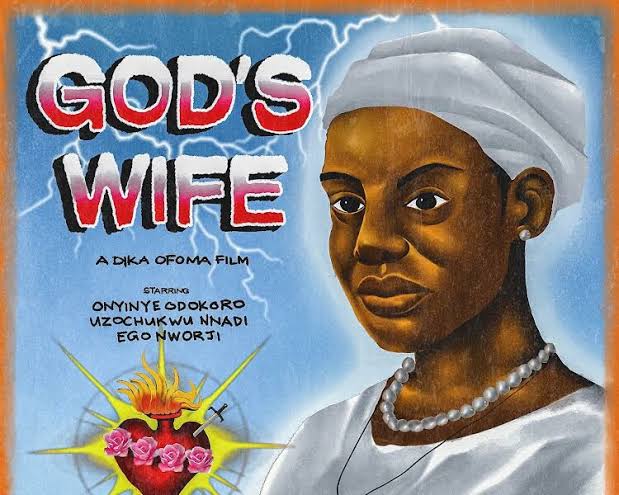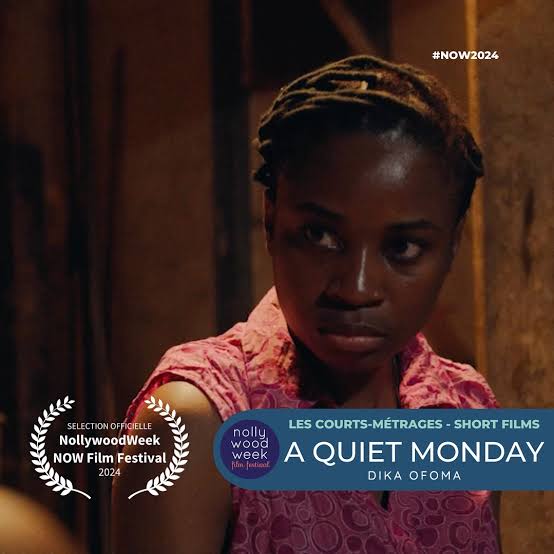The Creator and His Film: Dika Ofoma Discusses His Art, the Industry, and ‘A Quiet Monday’
Tochukwu Precious Eze
- 4th July 2024

"A Quiet Monday" (2023) opens with a reverberating melody. As the scenes unfold—heaps of yam, crates of beer, elders nibbling on añara (garden eggs), and young women swaying their hips to the rhythm—you find yourself immersed in the ambiance, nodding along. This is a scene that feels intimately familiar. Dika Ofoma’s filmmaking approach, which aims to tell nuanced, human stories about Nigerian life and culture, ensures that his films are deeply felt, first because we are human, and second because our lives and cultures are intricately connected.
Dika was born and raised in Gombe before his family moved to Abuja. Reflecting on his childhood, he shared:
"It (my childhood) was fun, living with family. We had cousins around, and there was love, happiness, and some days with a bit of sadness. Gombe was a small town, and each day we would go to school, come home, and do the chores. My family was multilingual: we spoke Igbo, we spoke English, and we spoke Hausa at home. With some of my siblings, and sometimes with my parents, our intimate language of communication is Hausa. With others, it’s Igbo."
When Dika visits his hometown and converses with his grandma and cousins, he realizes that his Igbo is not as fluent as he once thought. Their fluency is richer, given that it is their primary language of communication. Nonetheless, Dika insists he can carry a conversation in Igbo and has never had to formally learn it, as he has always spoken the language with friends and family. "There’s just a difference between someone who speaks Igbo primarily and me, who, you know, spoke it mostly with family and close friends."
"A Quiet Monday" takes on a natural, free-flowing Igbo that does not strive too hard to scrub off every trace of Western influence on the language. It is evident when the protagonist, Kamnonu, says, “kedu ihe I meani? (what do you mean?)” that Dika has chosen to portray a rural Igbo town realistically, in a nation where formal education is conducted in English—its official language.
Growing up in Northern Nigeria, Dika did not have access to Igbo films and literature. He recalls: “Igbo literature, not at all. I remember one visit to my uncle’s in Umuahia, and he tried to teach me to read the Bible in Igbo. I still don’t read Igbo very well. With films, there was one time, around 2010, I think, when my dad got this film called Agbusi Gbaa Otele, a comedy with Stephen Alajemba. That is the first Igbo film I can remember seeing, and it was just a one-off. It wasn’t constant.”
Dika acknowledges that the primary challenge in making "A Quiet Monday" in Igbo was reconciling the dialectal differences between the actors and ensuring that characters from the same town spoke the same dialect.
Beyond his role as a filmmaker, Dika Ofoma is also a film journalist and writer. He views the Nigerian film industry from an individual rather than collective perspective, stating, “In every era of Nollywood, there were individuals who cared about production value, the quality of their stories, and all the things we applaud today. You would equally find individuals who only care about how quickly they can make and release films. Speaking about the 90s, I would mention Amaka Igwe, Tunde Kelani, Tade Ogidan, Tchidi Chikere as those who cared about the stories and production value of their films. In the early 2000s, I would mention Christian Onu who directed Terrible Sins, and in the mid-2010s, Kunle Afolayan, Chineze Anyaene of ‘Ijé: The Journey,’ and Mildred Okwo of ‘The Meeting’. Now, there are many more names.
“Nollywood is a big industry. Things tend to change, yet somehow stay the same. The true evolution has been in terms of distribution, moving from home videos to now having films shown in multiplexes across the country and sometimes in cities in the UK and America.”
Made in conjunction with Bluhouse Studios, "A Quiet Monday'' had its world premiere at the 27th Internationale Kurtzfilmtage Winterthur in Switzerland in November 2023. It was selected for the Nollywood Week Film Festival in Paris 2024, the African Film Festival New York 2024, and has been screened across the country.
"A Quiet Monday" was inspired by Dika’s frustrations with the Monday sit-at-home situation in the southeast. Aiming to tell an engaging and honest story about this situation, he crafts the narrative around Kamnonu, a wilful young woman in an Igbo community whose business is affected by the sit-at-home exercise, and her supportive brother. Uzoamaka Aniunoh and Emmanuel Igwe team up to deliver a convincing display, with sparks of brilliance—such as the scene where Aunty Nneka (played by Ozioma Ejiofor) sings and dances into Kamnonu’s shop to share news of her daughter’s safe delivery—giving the film an air of genuineness. With a story that pokes at a sensitive political issue, we find that honesty is the priceless adhesive holding the mirror in place, daring us to look within.
“I cared about how people would perceive this. At its core, 'A Quiet Monday' is about Biafra, and the Biafra story didn’t start in 2021; it goes back deep into Nigerian history. My fear was that making it as a short film wouldn’t capture the entire story. How do I make viewers who aren’t familiar with the Biafra story understand why the sit-at-home happened? What has led the entire region to allow it? We tried to discuss Biafra and the situation with Nigeria, to let the audience know there’s more to this.
“What I wanted everyone to take away from the film is this: if we say the fight is for Igbo people, (we must confront the fact that) the people feeling the impact of the sit-at-home situation, the unrest and insecurity in the southeast, are the Igbo people. The man in Aso Rock is not affected. It’s the lives of your brothers that you are disrupting. The exercise is counterproductive. That’s what I wanted to remind audiences with 'A Quiet Monday.'”
Determined to make more films in the future, Dika’s ardent desire is for them to resonate with his audiences: “My next short film, 'God’s Wife,' is coming. It’s been in post-production since December 2023, and we are done now. I watched it recently and realized that I really like the film. I’m happy to share it with the world soon, so fingers crossed. Hopefully, it’s showing in Lagos in December, and I’m hoping to screen it in Enugu soon.”

Dika Ofoma will be making short films for a while before transitioning to the next phase of his career, which could be feature films or series. He looks to explore themes around Igbo culture, as well as the culture of Northern Nigeria where he grew up. Away from movies, Dika also enjoys literature, music, and visual arts.


